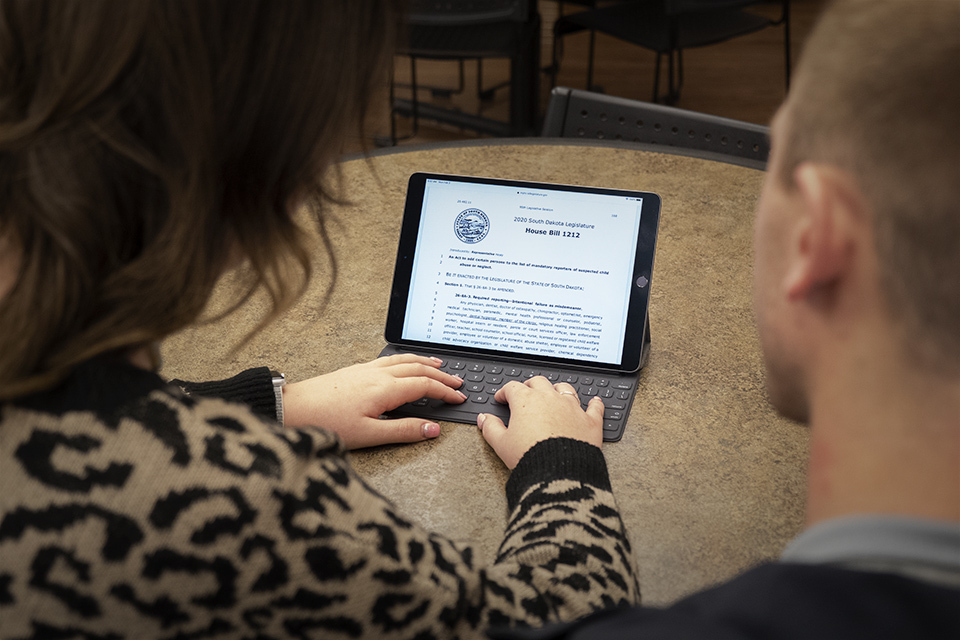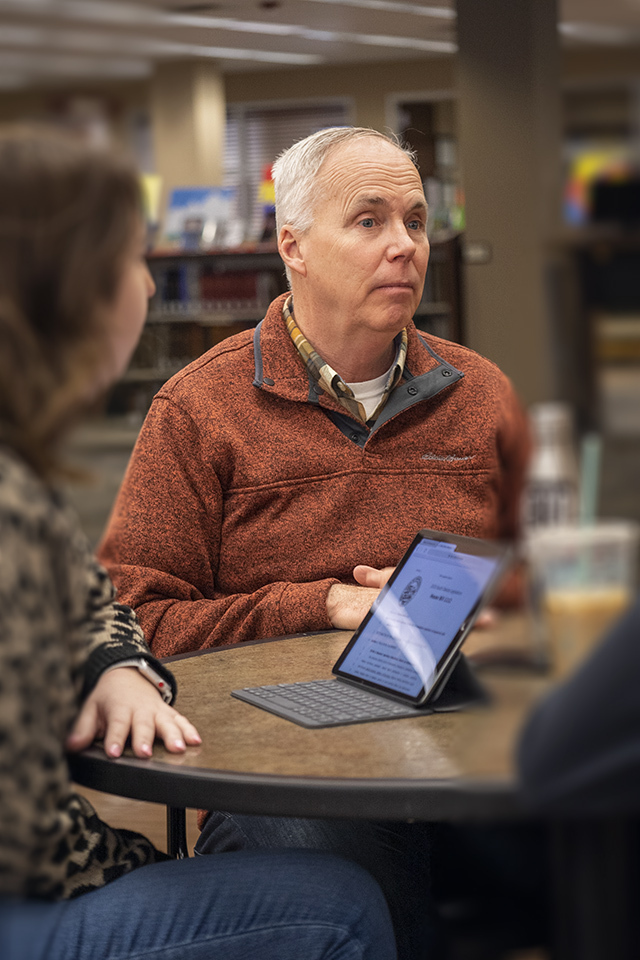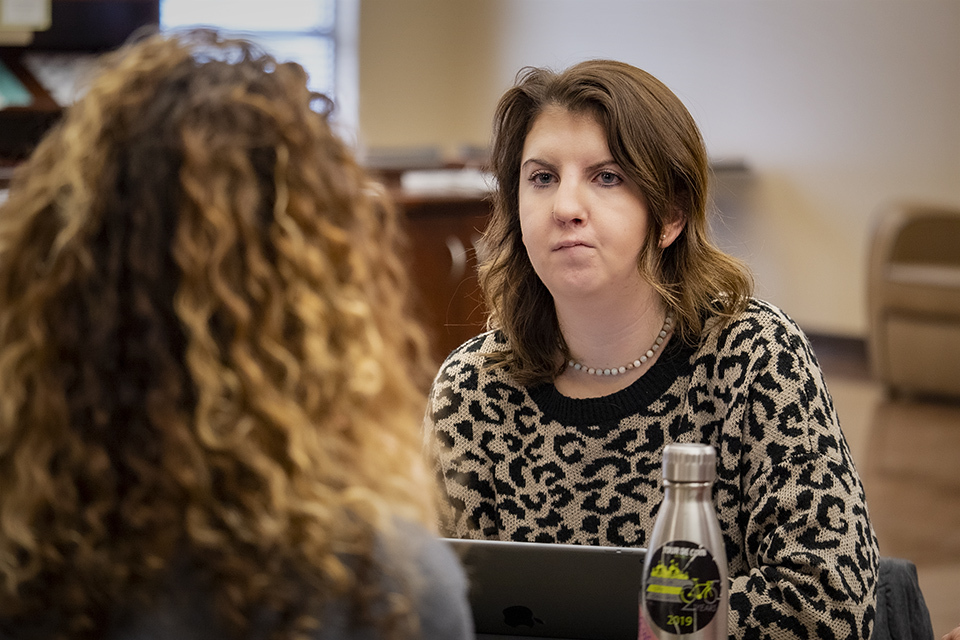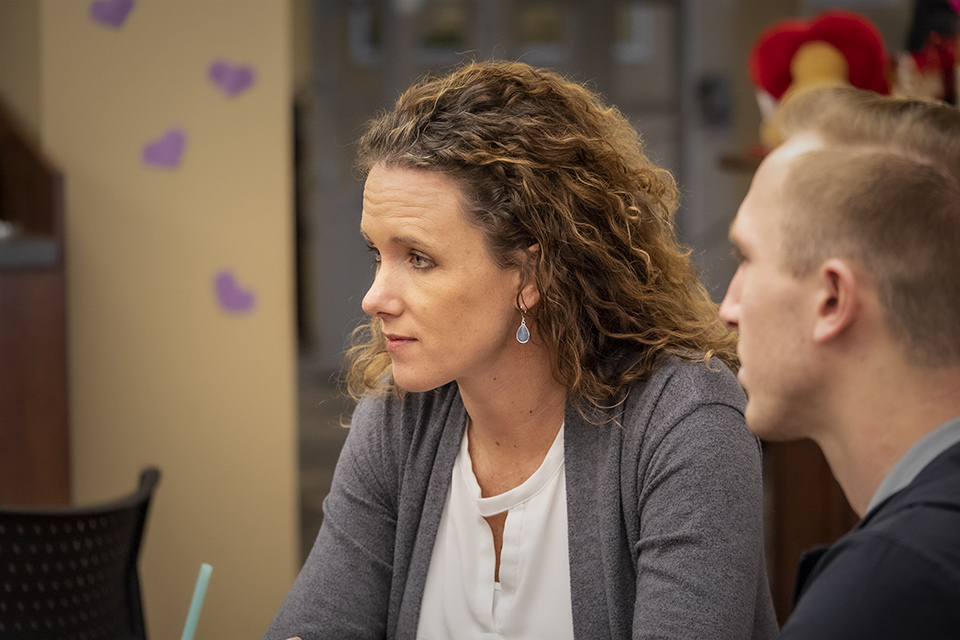
Bill seeks to add clergy to list of mandatory reporters

DWU Students Andrea Hult and Rex Schlicht review HB 1212 on their tablet in the McGovern Library. Photos by Dave Stucke, Dakotas Conference Communications.
The South Dakota Legislature will consider a bill that adds clergy to the list of mandatory reporters for suspected child abuse and neglect. There are approximately 46 states that either specifically include clergy in their reporting laws or that don’t mention clergy but that have an “any person” designation. North Dakota does require clergy to report suspected cases of child abuse and neglect.
During the 2019 legislative session, six students at Dakota Wesleyan University, in a public policy course, played a significant role in getting the bill on the legislative docket. The class researched the topic, developed a case statement, found a bill sponsor—Rep. Erin Healy, and worked with the Legislative Research Council to get the bill to the 2019 legislature. The bill passed through committee but failed by one vote on the house floor.
“The bill passed the House Committee but was narrowly defeated on the House Floor by a vote. Some representatives expressed confusion around some of the bill language and others were concerned about implications on church policy,” says Dr. Alisha Vincent, a lay member of Dakotas Conference Board of Ordained Ministry and an associate professor and chair of the nonprofit administration program at Dakota Wesleyan University (DWU), who led the effort to get the bill before the South Dakota legislature in 2019.

Dr. Joel Allen, professor of Religious Studies at Dakota Wesleyan University in Mitchell, SD, is seen meeting with students and faculty about HB1212.

DWU student Andrea Hult has been working to garner support for HB 1212, a SD House bill to require mandatory reporting of instances of child abuse. North Dakota already makes reporting by clergy mandatory.
The 2020 legislative session brings an opportunity to refine the bill. Students and professors at Dakota Wesleyan University are spearheading the effort to get the bill passed this session.
Vincent says, “The language of the bill has been simplified. Dental hygienists were also added, per request by the Dental Hygienists Association. Last year there was language about religious privilege included in the bill. That has been removed.”
SD Representative Erin Healy, a democrat from Minnehaha County, is the bill’s primary sponsor. She has also worked with members of the South Dakota House and Senate to improve the language of the bill.
“I think protecting our state’s children is important. Modifying the existing law to include clergy and dental hygienists, professionals who may have access to important information about the wellbeing of children, can only help,” says Vincent.
Bishop Bruce R. Ough, resident bishop for the Dakotas-Minnesota Area, and the Dakotas Conference Board of Ordained Ministry (BOM) will register their support for the 2020 legislation. Support from other denominations looks positive with specific changes to the language.
This spring, Vincent is not teaching the class that instigated the bill getting on the docket. So, one of Dr. Joel Allen’s classes has taken this bill as a class project. Allen serves as a professor of Religious Studies at DWU.
“We are calling representatives of the clergy in various denominations and religions to inform them of the bill and to inquire about their opinions,” says Allen. “Once we’ve collected this data, we’ll analyze it and provide a report to Representative Healy. Hopefully, the report will show that clergy are in favor of being mandatory reporters.”

Dr. Alisha Vincent and DWU student Rex Schlicht have been working on publicity and awareness of HB 1212 during spring semester 2020.
The bill has completed the writing stage and is designated as South Dakota House Bill 1212. The bill will soon be assigned to committee for consideration. Last year the bill was referred to the House Judiciary Committee.
The legislation is important to Allen because of his past experiences as a clergy leader at a church. “Many years ago, I had to report an instance of child abuse,” says Allen. “I was serving in Kentucky at the time, and clergy there are mandatory reporters. The fact that it was mandatory helped me to do the right thing and report. The perpetrator was a parishioner of a clergy acquaintance who pled with me not to report. Knowing I was required to report helped me do the right thing.”
Andrea Hult and Rex Schlicht, two students at DWU, are working on getting the word out to supporters of the legislation. “Rex and I work beside Alisha and Joel to put the bill out there, so more people are aware that clergy are not mandatory reporters,” says Hult.

Students and faculty from DWU met recently and discussed their progress in building support for HB1212.
Hult jumped at the chance to get involved last fall. “I am involved because it is two things—children and faith, that I am most passionate about. When Alisha told me back in August that she and Joel were taking the bill back to Pierre, I was more than eager to help,” she says.
Schlicht shares that his involvement is driven by his desire to live out what John Wesley's mantra. "I am involved with this because when I first learned that clergy were not on the mandatory reporters, I was shocked," he says. "Clergy are some of the most appreciated and trusted members of our society, so I just thought it was logical to have them as mandatory reporters. My thoughts on this would be, if this bill helps one child in the future, it is worth it. As we often hear John Welsey’s mantra to do all the good we can, I feel this bill works towards that common good."
People can register support by contacting Erin Healy at Erin.Healy@sdlegislature.gov. Individuals are encouraged to call their representatives or senators and tell them to advocate for House Bill 1212.
(posted Feb. 3, 2020)